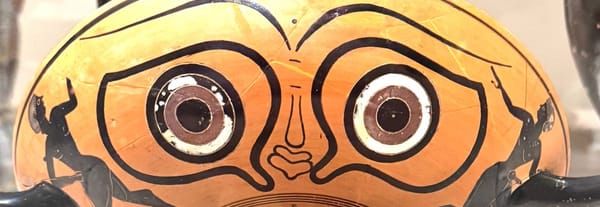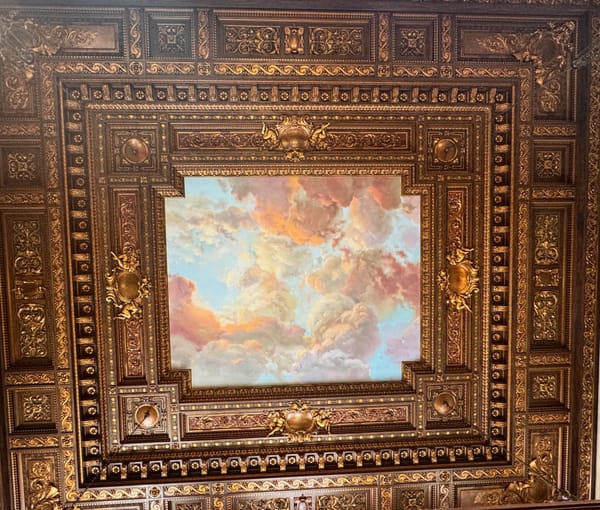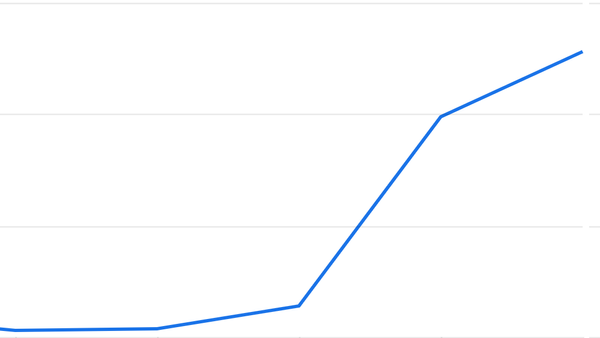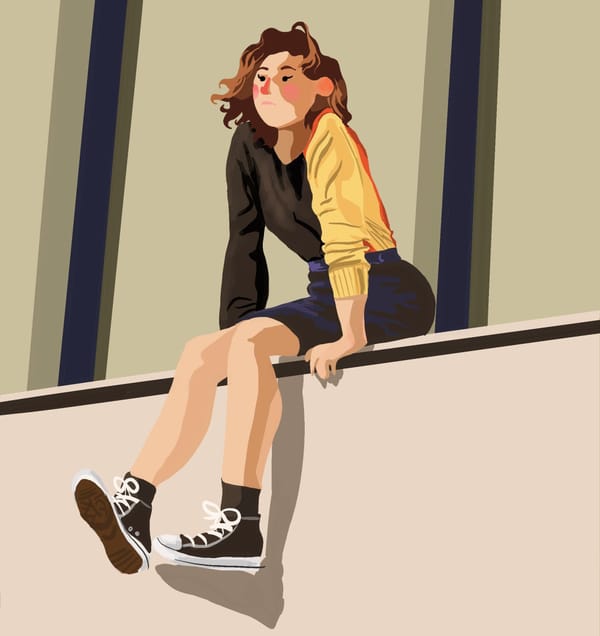On the Birth of a New Internet
Watching the old web die a painful death as something new is being born from the ashes.
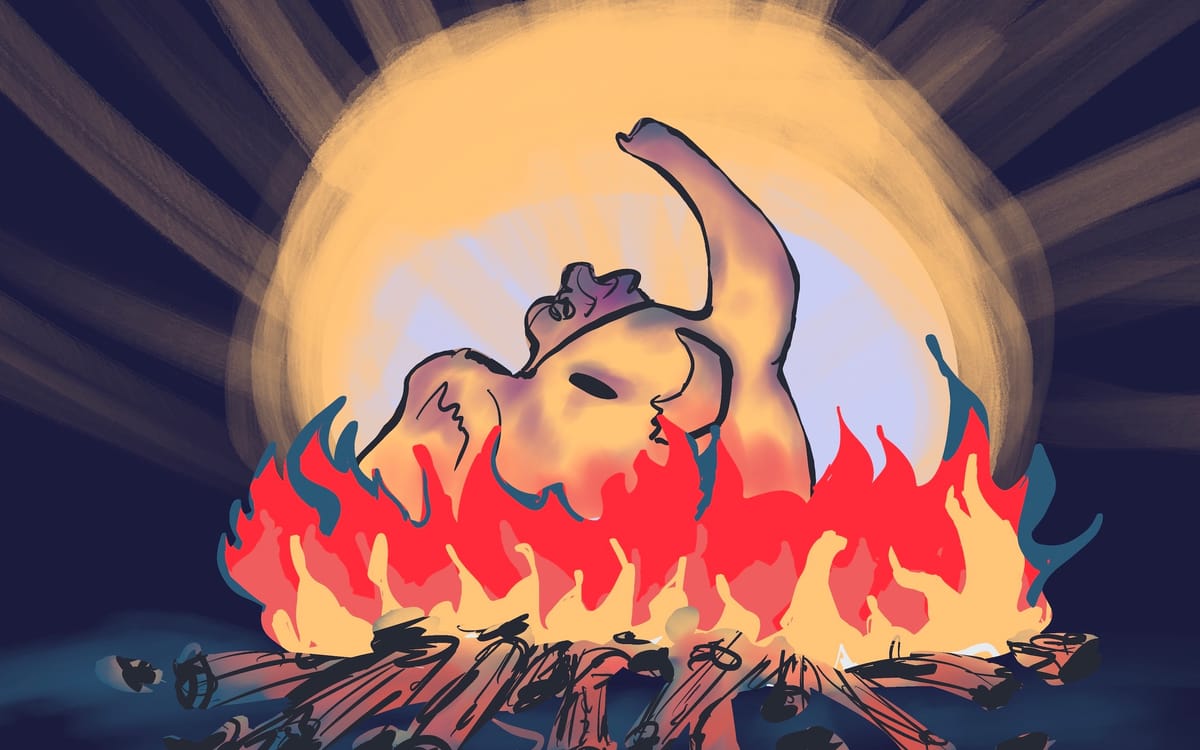
Why You Should Care
If you make or read stuff on the internet, this essay should concern you.
I want to tell you a story about how I, a marketer with a small social media following, accidentally blew up Mastodon with some war reporting. And then I will show you what that experience, together with some recent developments on other social networks, can tell us about this weird moment we’re living through and what the internet might look like on the other side of it.
My thesis? How about this:
Mastodon and the Fediverse are a microcosm of a massive, fundamental transformation that the internet is experiencing in the year 2023. The internet we knew from the previous 15 years, dominated by a handful of large corporations and their social media apps, is dead. Twitter, Reddit, Meta, even Google… old internet giants are convulsing while taking their final breaths. Even if their businesses survive, they will take on radically different shapes.
Something new is coming to life in their ashes, taking its first uncertain steps in the shadow of the colossal corpses that it’s meant to replace. And you, reading these lines, have a unique chance to not only witness this rebirth but to shape what a new iteration of the Web might look like. Don’t miss it. (And no, it’s not crypto. That’s dumb.)
For the sake of keeping this post concise (at least, for me), I will focus on my personal experience and recent developments on specific platforms. In particular, I’ll touch on LinkedIn, Twitter, Bluesky, Reddit, and the larger Fediverse (which includes Mastodon and many other decentralized apps).
Did You Say… “War Reporting”?
Let’s back up and cover some basic facts.
Last weekend, I got suspended from LinkedIn. So, like any reasonable marketer who got cut off from her top promotional channel, I… became a war reporter on Mastodon.
Yes, you read that correctly. I ditched content marketing and spent three days reporting on a coup attempt in Russia to a rapidly expanding audience from Mastodon and other corners of the Fediverse.
Does Anyone Even Read the News on Mastodon?
Before you click away thinking that anything on Mastodon or the Fediverse is “too small” to care… look at my statistics from that weekend:
Adding up those numbers for three days of my Mastodon activity, we get:
- Likes - 3,089
- Shares (Boosts) - 1,567
- Replies - 272
Keep in mind: I’m a small account. On Friday, when the coup began, I had around 800 followers. On Monday, I had 1,973 followers. Huge jump, but still nowhere near top accounts on Mastodon or the Fediverse as a whole. I wasn’t known as a Russia or Ukraine reporter. I was just some marketer who happens to speak Russian and Ukrainian. And then I began posting.
Oh, and one more thing: Mastodon doesn’t have an algorithm. All of these numbers are 100% from people seeing my posts and deciding to share them with their own followers. Fully organic reach and engagement. The “Holy Grail” of digital marketing.
Yes, you should care about this. If you’re a marketer or a content creator, my little weekend adventure should matter to you.
Is Organic Reach Dead?
You’ve probably heard others say lately that “organic reach is dead”.
It would be easy to dismiss that worry. I could say “pfft, people have been saying that about Twitter / Facebook / Google / etc. as long as they’ve been around.” Or I could pretend to be more sympathetic and remind you “you’ve just got to play the game. Algorithms change and we need to adapt.” But neither of those are the full story, are they?
Every day, I see marketers wondering why they can’t reach most of their following or how they can actually get exposure for their brands. At the same time, I see users frustrated that their feeds are flooded with spam and intrusive advertising on platforms run by billionaires who chase one hype cycle after another.
The internet does kind of suck right now. Both casual users and creators are unhappy, and there’s a growing sense that something is… off. That these platforms are getting worse and we are losing our systems for making connections, finding information, and building audiences.
Old Internet Giants are Probably Dying
One popular term to describe this current wide-ranging internet awfulness is “enshittification”. As the term’s author, Cory Doctorow, describes enshittification himself:
“Here is how platforms die: first, they are good to their users; then they abuse their users to make things better for their business customers; finally, they abuse those business customers to claw back all the value for themselves. Then, they die.”
Many popular platforms are definitely going through that final phase of taking away their own value from individual users and business customers. Just take a look at what’s happened with the internet in the past month or so:
- On Twitter, Elon Musk blocked viewing posts without an account and then limited free users to reading 600 (soon to be 800) posts a day.
- On Reddit, CEO Steve Huffman decided to charge for API access and then squashed a massive user protest by kicking out moderators from their own communities.
- Meta has been losing money and failing to convince anyone that virtual reality (or a “metaverse”) is the future.
- Bluesky had to pause sign-ups because that many users were fleeing Twitter.
- LinkedIn changed its algorithm, sending creators into a tailspin. In the meantime, they’ve been struggling to take down fake profiles and their systems are flagging real people (like me) for no real reason. (They’ve also announced an AI post generation feature!)
- And… AI content in general is already flooding the internet with garbage websites.
The internet is definitely changing. And clinging on to “eh, this site’s survived thus far” won’t help any of us. We can’t adapt to new circumstances when we’re busy burying our heads in the sand.
It’s Okay for Businesses to Die
Warning: spoilers for Disco Elysium. Skip to the next section to avoid them.
The internet today reminds me of the Doomed Commercial Area in a brilliant RPG video game titled “Disco Elysium”. In that game, you play as a detective who is trying to solve a murder in a forgotten and poverty-ridden district of a fictional city called Revachol. And one of the zones that you can discover as you play is a literal basement filled with abandoned and failed businesses.
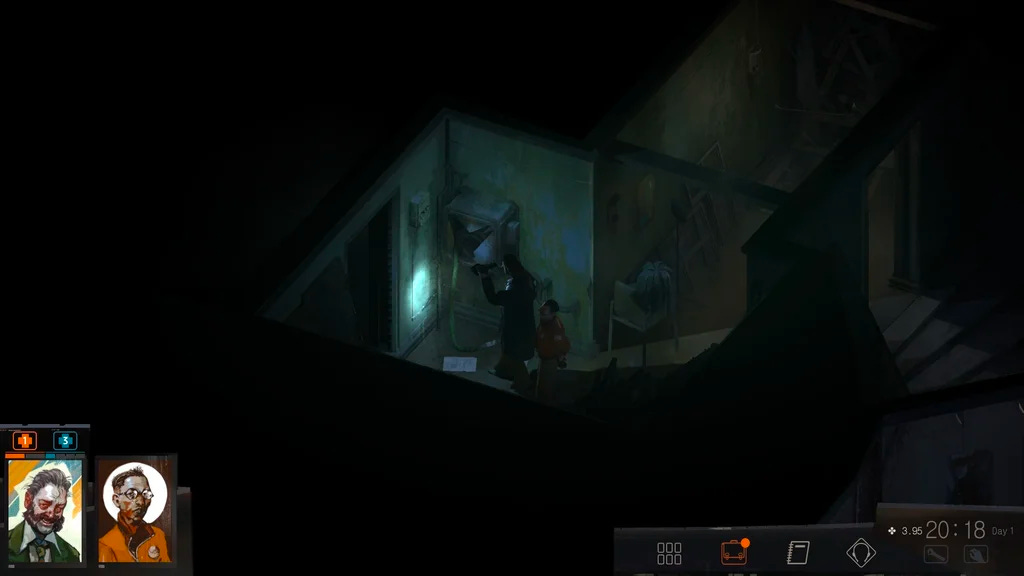
"It's just capitalism." She shrugs. "We only hear about tales of success, so it's often surprising to realize how many ventures actually fail."
Those words are spoken by a woman who works as a Novelty Dicemaker and is the owner of the sole surviving business in that entire building. If you’re lucky, and you successfully try a particular dialogue option in the game, you get to experience some of the most beautiful dialogue I’ve ever seen in a video game:
Novelty Dicemaker: “It’s a mourning ring,” she replies. “I made this when my first company failed. It was a small jewelry shop right here in the East Delta Commerce Centre, built with the little I inherited from my parents…”
“I drove it to the ground within a year. I didn’t have what you would call a viable business plan.”
You: “Why are you telling me this?”
Novelty Dicemaker: “It wasn’t just the jewelry shop either. I always thought that it was just the world, that you were supposed to try again and again until you finally succeed.”
“And now you’re telling me, what,” she closes her eyes, “that it was all because I didn’t run my little shops and ventures from a dump inside an abandoned chimney?”
You: “I’m sorry. I don’t know what to say. It’s entropy.”
Novelty Dicemaker: “Yeah.” She stares out of the window, not really hearing your words. “Or maybe it’s the entire world that’s cursed? It’s such a precarious place. Nothing ever works out the way you wanted.”
“That’s why people like role-playing games. You can be whoever you want to be. You can try again. Still, there’s something inherently violent even about dice rolls.”
“It’s like every time you cast a die, something disappears. Some alternate ending, or an entirely different world…” She picks up a pair of dice from the table and examines them under a light.
Everything new is the death of everything else that could have been. And sometimes, the things that die might have been wonderful places of digital community. Maybe it was the site where you met your best friend, or even your partner. Maybe you found your job because of that site. Maybe it was where you first fell in love with the craft that now makes up your identity.
Even if something once made life worth living, its end doesn’t mean you should die inside. We go on. We roll the dice again, and again. We can take on new roles with new usernames and play new games on new platforms. And whenever we make a choice… some alternate ending disappears.
Where Did Everyone Go?
It feels like everyone is gone. But people are still there. Millions of people still have phones and computers. Many people still have internet access. And most of them still want, just like they did two years ago, to log onto the World Wide Web and find other humans talking back to them, directly or broadcasting content at larger crowds.
These internet communities that we all miss? They appeared because we wanted them to. Some tech companies provided the infrastructure, sure. But the moments of connection, jokes, friendships, creativity, art, business deals, obscure references, elaborate explanations, announcements, and shared frenzy – all of the beautiful things that made the internet enjoyable and useful were created by us. Humans. Normal people who need to eat food, shower, and sleep. People like you, reading this post, and me, writing it.
And when people are still there, you can find them. It might just be a little harder than you are used to.
A New Place: Why Mastodon and the Fediverse are Important
Mastodon is a decentralized Twitter alternative that’s part of what’s called “the Fediverse”. The Fediverse is a large network of different social media websites & apps that all talk to each other via a protocol called ActivityPub. It’s pretty cool and you can get very nerdy with all of it.
Mastodon is most popular app in the Fediverse right now. Even so, it’s often dismissed as an irrelevant Twitter alternative. But regardless of total user counts or what might happen in the future – Mastodon is important. Not even for the app itself, but for what it stands for.
If I told you, in 2014, that thousands of people would be passionate about decentralized social media, opting in to pay volunteer administrators for server costs, and determining digital privacy norms via open forum – you wouldn’t believe me. You’d ask me why everything wasn’t owned by Facebook yet, and I’d gleefully inform you that the decentralization people have been voting whether or not to ban Meta (sorry, Facebook’s name is way more lame now) from interacting with their independent servers. Because yes, even Meta wants to join the ActivityPub party now.
The mere fact of those conversations happening at all, let alone the extent of resistance to big corporations like Meta connecting with the Fediverse, is incredible. We have a whole group of online outcasts, many of them queer, trans, non-binary, or neurodivergent, who made their own corner of the internet. And now that corner of the internet is successful enough that the old social media giants are crawling towards it, in their final bid for a second life.
More so, this social media without an algorithm or an owner is by far the most active, engaged, and interesting online space that I’ve been on in recent memory. The Fediverse is buzzing, with people sharing what they’re working on, thinking about, or enjoying. So even if this particular moment doesn’t last (even though I really hope it will), the Fediverse has proven its concept plenty.
What We Lost with Web 2.0
So-called “Web 2.0” made us complacent to consolidation of many internet spaces for different interests, contexts, and demographics into a few universal “public squares” where everyone hung out. Instead of clicking from a news site to a Flash game library to a cybersecurity forum… we got used to following a bunch of accounts tied to every interest we have and then finding all of that information in one easy, convenient feed.
It was comfortable and simple. I enjoyed it as much as anybody. It was nice to log into Facebook and see everyone I knew sharing their recent photos. It was fun to scroll through Twitter as every current event imaginable was reported upon in between horribly crass memes. It was quick to research industries for client projects on Reddit, which hosted data engineering experts one click away from women with ADHD.
Look, we’ve lost our muscles. We haven’t had to actively seek out our crowds because everyone was in the same place. We lost the art of curating our own internet experiences because algorithms would simply do it for us. But that’s not happening anymore. The internet of 5-7 giant websites has fragmented and that’s okay.
I promise you that people are still there, ready to listen. Because you can still post fast translations from Russian and Ukrainian Telegram channels one Friday evening, and suddenly you might get flooded with gratitude like this:
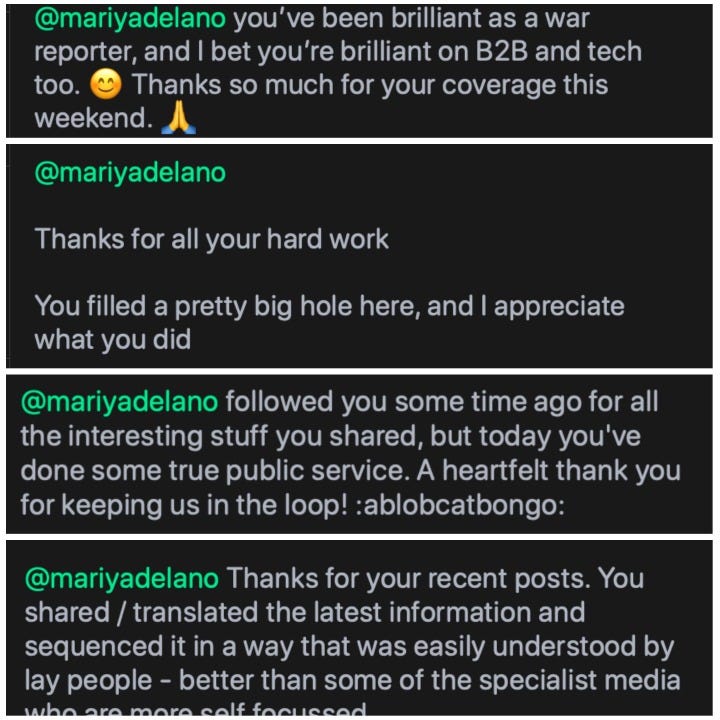
I am not special. I’m not some genius with hidden talents and a masterful understanding of social media. I’m not an unusually charming creator or the best writer alive. I’m not even that good of a translator, simply a native speaker of a couple languages.
But I managed to provide something truly valuable to a fair number of people. And they showed up. Many of them stayed, even when I switched back to my usual posts filled with marketing, tech, and cat pictures.
Trust me, you can still find people too.
Why Does the Internet Even Matter?
You’re probably thinking: “finding people on a new platform is hard, especially needing to do that over and over again with fragmented communities. Why should I put in all of this work?”
You’re not alone if you feel that way. Many have resigned: either to a digital dystopia where the same corporations continue fighting over a rapidly diminishing pie of human users, or to giving up on the internet as a project entirely. What you do is your own prerogative, but I can’t give up on the internet.
I believe in the internet as something worth fighting for. From the bottom of my heart, I believe that the internet is worth it.
I believe with the faith of a little girl who grew up in a small town in Ukraine, undiagnosed with ADHD and severely bullied for her strangeness. A little girl who felt like an outsider in the real world, but who ran to her computer to talk to her online friends. Those friends only knew the girl through a screen, wholly unaware of her strange mannerisms, her hyperactivity, her fear of eye contact. This girl discovered her confidence dreaming up stories in forums and chatrooms until 3 am, exploring, sharing, falling in love with other humans and the things they made.
For the sake of that little girl, I will not give up on the internet.
I will not give up on finding connection in digital spaces. I don’t give a shit if every single website I use today burns down. I will rebuild from their ashes. I will find my people wherever they go next. And I will, again, marvel at the love and beauty of spontaneous connection and deep exploration of mutual interests.
Without the internet, I had nothing. I was a little girl bullied, alone, and severely abused. The internet gave me dreams and I will preserve that for others. I have to.
Why Should We Create Stuff Online?
The internet is important. Even if it’s not important to you, the internet is still important to so many people around the globe, for reasons we can’t even imagine.
So, if we consider ourselves creatives or content producers of any kind – do we have an obligation to make and publish stuff online? Should we carry on posting, hopping from one platform to the next as everything falls apart?
I think that creating stuff online is even more important when everything feels pointless. In those moments of chaos, destruction, spam, and unbearable cringe – that’s when taking our craft seriously matters more than ever.
To illustrate my point, let’s go back to another time in recent memory when this whole “Internet” thing felt kind of silly: the year when the COVID pandemic shut down the world, 2020.
Welcome to the Internet
It’s easy to think of the internet the way it’s described in Bo Burnham’s song “Welcome to the Internet”. The entire comedy special, “Inside”, was incredibly popular and even won an Emmy. So I assume that even if you haven’t seen the whole performance, you will at least recognize the GIFs:
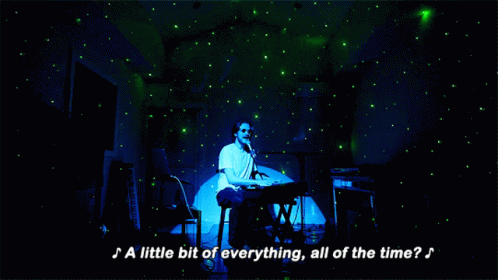
“See a man beheaded
Get offended, see a shrink
Show us pictures of your children
Tell us every thought you think
Start a rumor, buy a broom
Or send a death threat to a boomer”
The internet presented to us here is a malicious, mind-numbing, radicalizing ray of stimulating garbage. It’s a feed that’s gotten out of control. A poison fed to a population that’s too numb to resist. We’re all very familiar with the internet that brought us ISIS, Cambridge Analytica, and TikTok.
As creators, we were chained to never-ending algorithmic demands that we continue making more and more content, feeding that parasitic hose. We didn’t want to add to the sewage, but if we wanted to maintain any relevancy in those universal online spaces we had to play by the rules. We tried to go viral. We posted more often. We stuffed our blogs with keywords and polluted our captions with irrelevant trending hashtags. We were prisoners of a system that we enforced.
Why would we want to hold on to any of that?
I see “Welcome to the Internet” now as a eulogy for the old web. It was exciting, it was overwhelming, it was terrifying, it was… a little bit of everything, all of the time. And this song is a reminder for why we should let that version of the internet rest in peace, dead.
All Eyes on Me
I actually don’t think “Welcome to the Internet” is Burnham’s most interesting song about the internet within “Inside”. I am much more interested in what he says in another part of that special – the finale, titled “All Eyes On Me”
If you haven’t heard this song before, I highly recommend watching the entire thing on YouTube (warning: deliberately uncomfortable eye contact):
Welcome back. Was that a relaxing experience?
No, of course not. Burnham is trying to stress you out and jolt your brain awake. From the very first lines, even as he sings them ever so softly, Burnham is telling you not to trust him or the safety of the screen between you:
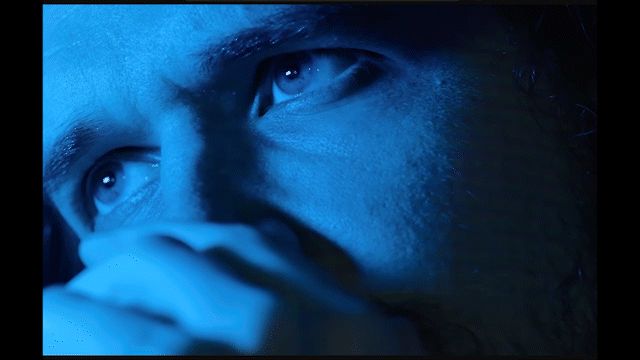
I feel so seen, exposed in my own skin, whenever he makes eye contact with the camera in those shots. Because while in “Welcome to the Internet” Burnham obscured himself by hiding his eyes with dark glasses, in “All Eyes on Me” he takes all that distance away. This song is about the sad, stressful, and soul-crushing reality of a performer who doesn’t have anyone to perform for.
We’ve been taught that as “creators” online, we needed to sanitize away every uncomfortable facet of the creative process. “Show your work,” but only in social-media-friendly formats preferably with some nice filters, cropping, and lights. “Become your personal brand,” but don’t swear or talk politics in fear of offending anybody. “Build an audience,” but only from the people who the algorithm determined to be relevant enough.
Be a creator in a way that is always friendly to all advertisers. And don’t look too uncomfortable! Just tell your new borrowed audience to calm down:
Don't overthink this
Look in my eye
Don't be scared, don't be shy
Come on in, the water's fine.
Don’t talk about controversial, even as climate change threatens to turn our entire planet into a hostile, uninhabitable hellscape:
You say the ocean's rising like I give a shit
You say the whole world's ending, honey, it already did
You're not gonna slow it, Heaven knows you tried
Got it? Good, now get inside.
When Burnham dances in that shed, all alone with his shadow multiplied by his lights, I feel shivers running down my spine:
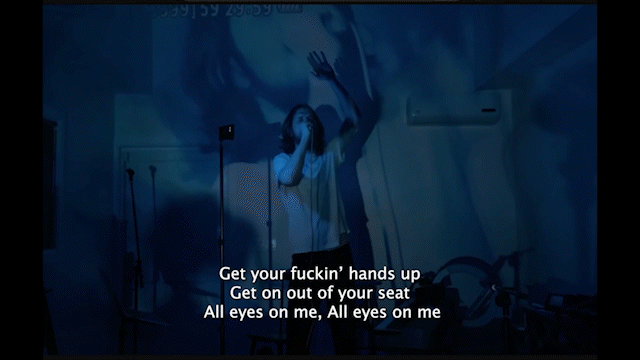
This is a man, all alone in a dark room, singing about the exhilaration of holding the attention of a live crowd. The performer’s desire to get everyone’s eyes on himself. The energy of getting people to do something in perfect sync, controlling the mood of a room as everyone gets up from their seat.
As humans, we find joy in feeling like part of something bigger with other people. Most of us know the feeling of going to a live show and getting swept up in the emotion of everyone around us. For a moment, we can forget about our own problems. For a second, we feel less alone.
Even if the performer is selfish in wanting the spotlight on them, the performance is good when that selfishness disappears in the illusion of a good show. Sure, we’re watching someone else on that stage. But when they do their job right, in watching them we can finally see ourselves, together.
Keep Making Stuff on the Internet
Even if you can only reach one or two more people, you should continue making stuff on the internet.
You are not a “content creator,” even if you call yourself one. You are a performer. You are an artist. If you make stuff for other people to see, you are so much more important than the amount of likes that an algorithm might bless you with.
As an artist, you have a job. Your job is to help other people navigate the darkness of their own lives by exploring your own. You can turn that darkness into whatever you want: from “how to” tutorials about using software to heavy comedy specials to overly emotional newsletter essays. But don’t avoid it. You can’t be a guide for others if you’re too afraid to walk the path yourself.
The internet is dying. A new internet is being born. However indestructible a social network, way of life, or Russian oligarchy might seem… everything is vulnerable to being replaced.
So if we can replace the old, how will you write a new history of the web?
I will be writing a part 2 to this essay, on how we might want to behave in the new internet and what we may want that internet to look like. Feel free to subscribe below or follow my RSS feed.
Self-Promotional Note: If you enjoy my writing, you might also enjoy working with me! I run a small agency helping B2B tech companies with their marketing and creating better content. We currently have one client slot available.
Reading Recommendations:
- “The only way to win is not to play” by The Content Lab. A great reflection from one of my Mastodon friends on similar topics of creating and social media.
- “Fail Limit Exceeded” by Cheryl Platz. An excellent analysis of how what’s happened at Twitter will be a significant blow, even if the platform recovers.
- “No, Social Media Is Not The Same Thing As Lead Paint” by Mike Masnick. A more nuanced take on social media than “it’s bad for mental health”.
Musical Minute
On the topic of performers faking their smiles - this was always my favorite song by Queen:


